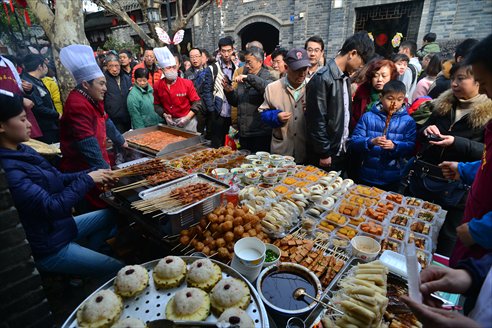New Yorker writer’s Chinese food poem sparks racism ruckus

People enjoy the offerings at a food stand in China. Photo: IC
Have they run out of xenophobia?
If they haven't, we've reason to fret.
After the controversy surrounding the Peter Liang case, Chris Rock's racist jokes toward Asians at the Oscars, we now have Calvin Trillin's poem about Chinese food.
A long time contributor to The New Yorker magazine, journalist and food writer Calvin Trillin found himself experiencing a huge backlash for his poem published in the April 4 issue of The New Yorker, "Have They Run Out of Provinces Yet?"
The beginning of the poem goes: "Have they run out of provinces yet?/If they haven't, we've reason to fret./Long ago, there was just Cantonese./(Long ago, we were easy to please.)/But then food from Szechuan came our way,/Making Cantonese strictly passé..."
Trillin is attempting to joke about the endless kinds of Chinese cuisine making their way into the US and the stress some may feel as they have to keep up with whatever cuisine is the latest trend. Later in the poem, he also mentions food from other areas such as Shanghai, Fujian Province and Tibet.
However, it's the poem's nostalgic conclusion that has raised the ire of many Asian-Americans: "Now, as each brand-new province appears,/It brings tension, increasing our fears:/Could a place we extolled as a find/Be revealed as one province behind?/So we sometimes do miss, I confess,/Simple days of chow mein but no stress,/When we never were faced with the threat/Of more provinces we hadn't met."
No excuse
Many Asian-Americans, non-Asian Americans and major media outlets also criticized Trillin's poem.
Trillin's consistent use of the word "they" when referring to Chinese, "we" as Americans and the use of "fret," "tension," "fear," "stress," and "threat" has led many to feel the poem is actually saying, "Now, as each brand-new group becomes more influential in the US,/ it brings tension, increases our (white people's) fears…So we (white people) sometimes do miss, I confess,/ Simple days of white people and no stress,/When we never were faced with the threat/of more races we hadn't met."
Although Trillin is just a food writer, his poem's nostalgia for "simple days" reveals the fears and worries some white Americans have about the rise of immigrants.
Fear of Asians is nothing new in the US. Back in the 19th century, a time when lots of Chinese immigrated to the US and other continents, the term "yellow peril" emerged, which basically painted Asians as a danger to the Western world.
Although the term is no longer used, prejudice against Asians is still firmly entrenched in many people's hearts.
Although Chinese food is quiet prevalent in the US, it is more accurate to say that most of what can be found is Americanized Chinese food. You'd have a hard time finding fortune cookies or General Tso's chicken in China.
But in recent years various types of authentic Chinese cuisine has been making their way into the Western world as more Chinese are heading overseas to study, travel or work.
This introduction of foreign culture has some people feeling overwhelmed and afraid.
It seems this fear has been gaining voice recently, especially considering the current race for US president. No matter how many hateful and absurd statements Donald Trump makes towards immigrants, he still remains a front-runner. This is because his opinions are shared by a lot of US citizens who are intimidated by immigrants.
Trillin defended himself to the Guardian by saying he was being purely sarcastic and that the poem "was simply a way of making fun of food-obsessed bourgeoisie."
However, while the poet tries to pass off his work as satire there were plenty of people who were not willing to accept this as an excuse.
" 'It's satire!' should not be used as safety net for poorly conceived, poorly executed, or unwisely published pieces," tweeted Celeste Ng, an Asian-American writer.
Of course not everyone was offended by the poem, and in fact many began jumping in to defend its author. However, in many cases this too revealed fear and hatred of immigrants.
This in itself kicked off another backlash. Karissa Chen, an Asian-American writer posted on Twitter, "I'm not angry at Trillin. Those of you defending him are way more scary and sad to me than he is."
"The same way I'm more afraid of trump supporters than Donald Trump, I find you defenders of Trillin's honor way more perturbing than Trillin."
Finding a voice
Over in China the reaction to the poem has been rather quiet. In fact some people have even seen the poem as praising China for its vast and diverse culinary traditions.
Yet, while those in the mainland may not care much about a poem written half a world away, it is understandable why many Chinese-Americans are upset.
Even in the US's current politically correct society, Chinese-Americans, or Asian Americans in general, still face prejudice in many different forms. In some cases it involves being treated as an outsiders and a threat, and in other cases it comes in the form of "good" stereotypes such as being studious or good at math.
Yet in the end prejudice, no matter what form it takes, can be hurtful and affect the lives of people.
Fortunately with the rise of social media and the connectedness that the Internet has brought, people are more easily able to speak up when such things occur, as is the case with Trillin's poem.
Recent movements like the Asian directors, actors and actresses protesting the academy for allowing Chris Rock to make racist jokes towards Asians on stage, or Asians protesting for Peter Liang indicate that Asians have decided to no longer stay voiceless. They are now speaking out loud.
Because Asian Lives Matter too.
Newspaper headline: Have they run out of xenophobia?